Lea Wait's Blog, page 113
April 27, 2021
So Ya Think Ya Know Maine?

John Clark battling the fifth episode of a malady I never heard of until it struck, ingrown eyelashes. Whether they’re related to cataract surgery, or will eventually go away on their own, remains to be seen, but each occurrence seems to happen about three months apart and feels like someone glued a tiny strip of sandpaper on the inside of my lower eyelid. Unfortunately, this time it hit on Thursday night and my eye doctor is closed on Fridays, so I’m making do with pain relievers and maudlin thoughts.
Back in the mid 1980s, I tried out for MPBN’s So You Think You Know Maine quiz show. Preparation included sitting on the hopper after the kids went to sleep and memorizing every question and answer in the box version of the game. I won three times and finished third in the final that year which was filmed in Deering Oaks Park. It was a fun and memorable experience. With that in mind, I thought it would be fun to challenge readers of the blog with some Maine trivia. (answers at the end of the column.)
1-Maine has numerous towns sharing their name with U.S. Presidents. How many are there and who was the last elected president sharing his surname with a Maine municipality?
2-Maine has sixteen counties. Several municipalities have the same name as a county, but not all of them are in the county whose name they share. Out of the following, which are in a different county? Cumberland Center, Franklin, Hancock, Kennebec, Knox Center, Lincoln, Oxford, Penobscot, Somerset Junction, Waldo, Washington, York
3-Kate and I grew up in Union. Like several other Maine towns, there was Union, North Union, East Union and South Union. Our father grew up in West New Portland which also had North New Portland and East New Portland. As far as I can tell, no town in Maine has entities with all four compass directions in their name (formal or informal). I’d love to be proven wrong.
4-There’s Northport, Eastport, Westport and Southport. Do they share anything in terms of proximity?
5-Let’s talk body parts (this is a mystery blog after all). How many towns/locations have a body part in their name. No need to list multiples, and towns like Livermore Falls don’t count.
I gave into a COVID-19 isolation impulse and had five of these bumper stickers made. The first day it was on my car, some woman who thought I was going too slow, tried to smooch my bumper. As soon as she saw this, she backed off and stayed far away until turning.
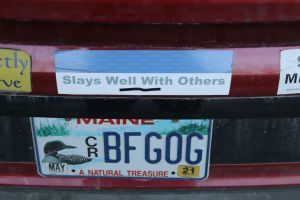
And now for some answers.
1-Nine, and Clinton was the most recent
2-Franklin is in Hancock, Kennebec is in Washington, Knox Center is in Waldo, Lincoln is in Penobscot, Washington is in Knox
3-I’m curious.
4-They’re well apart with Eastport in Washington County, Northport in Waldo, Westport and Southport are in Lincoln County, but on opposite sides of the Sheepscot River.
5-South Arm, Owls Head, Shin Pond, Prouts Neck, Back Cove, Kidney Pond, Heart Pond, Blood Pond, Lower Elbow Pond, Townsend Gut, and colloquially Finger Lakes http://lakelife.dovewayme.com/diving-into-maines-finger-lakes along with Nipple, a spot of land lying southeast of Virgin Island off the coast near Jonesport.
If you’re looking for a good spot to dispose of a body Consider Industrial Waste Pond in Easton because nobody is gonna fish in a place with a name like that. For those who like interesting websites, I found this which lists all freshwater bodies in Maine. https://en.wikipedia.org/wiki/List_of_lakes_of_Maine
April 25, 2021
The not so fun part of writing (cats are mentioned in this post)
Last month, I offered some “easy tips” on writing. Let’s face it, though, nothing is easy about writing, even if you really really really really like it. Don’t just take my word for it — in a few days we have a Maine Crime Writers group post on the hardest things about writing. There are many.
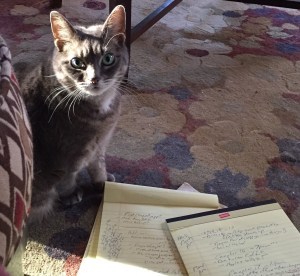
What do writing and herding cats have in common? More than you’d think.
That said, some things are harder than others. This came to mind last week as I read a couple books in a series (not by a Maine Crime writer!). I’m enjoying this series a lot, but the books brought to mind one chronic issue that I’ve seen many times as a book editor, and as a reader. It’s kind of a cat-herding thing — so much going on that some things are going to get away.
Before I delve in, I want to point out that it’s hard for a writer to keep all the cats herded. There are many. These metaphoracal cats range from things like spelling, punctuation and sentence structure to a couple of the ones I’m going to talk about today. It’s easy to overlook some things when you’re immersed in the writing. It’s a can’t see the forest for the trees thing. Or maybe can’t see the bushes for the trees, or can’t see some of the trees because of the other trees. Or all of those things.
While there are too many elements of writing a book to mention in a list, three came to mind with recent reading and I’m going to focus on them today.
Wait, whose head are we in?First is point of view. I know there are some really succesful and famous authors who shift point of view in the middle of a scene, or even a paragraph. As an editor and reader (rather than a writer who’s not nearly as succesful or famous), I’ll posit that they’re successful despite that slippage, not because of it.
Even when written in the third person, point of view is important. Whose head are we in? Whose perspective are we seing things from? A reader’s imagination is a powerful thing, but a major way to draw the reader fully into the story is to put them in someone’s head. If there’s no point of view, then readers are more detached. Just as jarring is if the reader is in one character’s point of view and then suddenly in another with no signpost. Readers need a signal that the point of view is changing — ideally a new scene, with an immediate signal as to who’s head they’re in now.
As a reader, you may not always notice point of view slippage. You may like the book and don’t really care. What you’ll never know is how much more you would’ve liked the book and its characters if the writer kept a firm hand on point of view.
At worst, point of view slippage can damage the narrative arc or dramatic tone. That happened to me with a book I was reading this weekend. A point of view shift (combined with a big block of unnecessary background exposition that even basic editing should have excised), made me think a character knew something about another character that he shouldn’t have. I took it for what it was — badly placed and unncessary exposition — and knew the character whose point of view we had been in didn’t know those things. Particularly since the exposition was written generically, not how the character as we’d come to know him would think. But a new reader to the series, particularly one who isn’t as obsessive as I am about things like that, would’ve thought this character knew something about another character that he didn’t, spoiling a lot of the dramatic arc of the story.
But I thought he was a nice guy!Another issue is making sure characters stay in character. From small things to big things, it’s important to be mindful of every action a character takes, even if it’s not a major one, and make sure it’s something he or she would do. This goes for what they say and think, too.
In one series I recently read, the protagonist, a polite and gentlemanly guy, though a little blunt at times, would “push” someone aside when he got urgent word of something and needed to get going. Usually it was a woman standing in a doorway who he was interviewing. I just couldn’t see him pushing, or sometimes “shoving,” anyone out of the way. And if that’s what the author actually intended, it should’ve been remarked on in the narrative.
I think the writer caught on eveuntually, because after about half a dozen books in the series, the protagonist stopped pushing women out of the way and started finding a more polite way to get out of rooms when he was in a hurry.
In another recent book I read, a character had just come back from serving as a nurse in a really ill-conceived war. She had very strong opinions on war and its place in the world and is hot-headed and not afraid to express them. Yet, in a scene that’s in her POV, when she sees another character talking to a child about how awesome war is and how many more there’ll be (Victiorian England!) that will allow the kid to be brave and honorable, her reaction is pleasure that someone is paying attention to the child. She has no reaction to the startling pro-war-any-war, subject matter.
The author was likely focused on the main point of the scene — the child being paid attention. But the strong convictions of the protagonist didn’t have to disappear to make the scene happen. If the author deliberately intended for the character to let go of her convictions because she was so delighted someone was being nice to the kid, that should’ve been mentioned. There are a lot of different ways the scene could’ve played out that would’ve kept the intention there, but also not had the character slippage.
Where did that thread go?Another thing a writer whould pay attention to is all the different threads. And there are so many in a mystery novel.
In a book I just read, a character had a life-changing, devastating issue with the muder victim, who was a close relative. Everyone knew it and it was remarked upon frequently to the detective. It made her a major suspect. Yet when he went to talk to her and asked her what she liked and didn’t dislike about the person, she didn’t mention it. He didn’t ask about it. Now, it could be possible the detective was testing her to see if she’d bring it up. But if that was the case, it would’ve been part of the narrative.
My thought in reading that scene was the that writer was focused on a lot of different things that were going on, and while it was in her head, it didn’t make it to the page. [An aside — an editor also should do several reads, one just as a reader. But that’s a blog post for a different day.] Meanwhile the reader, if they’re paying attention at all, is screaming “WHAT ABOUT THE BIG THING? ASK HER ABOUT THE BIG THING! THE ONE THING THAT MIGHT HAVE CAUSED HER TO HATE HIM ENOUGH TO KILL HIM!”
Also, the character being interviewed by the detective was described as mentally ill by many others in the book. There are hints by the authoer that she it’s possible she’s really not mentally ill, just mistunderstood and incredibly frustrated. She certainly does not act as she had been described when she talks to the detective, but instead is thoughtful, intelligent, rational and not overly emotional. So, my guess is it was the writer’s intent to show the juxtaposition between what other people, some with an ax to grind, want to depict and what the reality is to the detective trying to find out why the murder happened. But that juxtaposition was never made clear. Or, it could’ve just been that the thread that the woman was mentally ill got dropped. The reader will never know.
Back to the cat herdNone of what I’ve written about here is intended to put down or criticize a particular author or any specific books. But specific examples work best. And it’s a good reminder that even seasoned authors have trouble herding all the cats. When I was a freelance book editor I frequently felt in discussions with first-time writers that they wanted some kind of easy button to get past all the mundane tedious stuff. They often didn’t want to hear about the kind of work they had to do to tighten things up and get their great thoughts into a form that would allow readers to get the most out of it.
One thing I do when writing my own books is to try to make sure I have these issues in hand is do revisions for each character and their plot thread as one of my post-first-draft revisions. What that means is, I read the manuscript for Character A, making sure everything he says and does is in character, that all his threads are tied up, that every scene that’s in his POV doesn’t slip into someone else’s, or into a POV no man’s land. Major characters, in particular, take a lot of time and effort. Minor ones not so much, especially if there are no POV scenes for them. But you want to make sure they don’t sneak their POV into someone else’s scene.
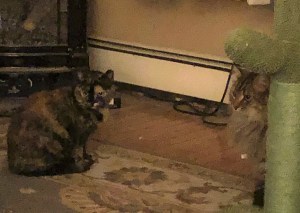
MILO: The Human thinks she’s gong to herd us. PENNY: Ha ha. Not on even one of my nine lives is that happening.
Other writers may have different methods. But there is no easy button, no matter who you are or what your process is. The important thing is to understand that it’s easy to overlook one thing because you’re focusing on another.
Writing in general is a lot of fun. Getting that story down, the big thoughts, seeing it all come to life is one of the most satisfying experiences a human who writes can have. But the only way to keep as many cats with the herd as possible is to do the tedioius work of grabbing them and… OK, let’s stop using the cat metaphor. You get what I’m saying — there’s ofthen still work to do, even when the “writing” is done.
April 23, 2021
Weekend Update: April 24-25, 2021
 Next week at Maine Crime Writers there will be posts by Maureen Milliken (Monday), John Clark (Tuesday), a group post (Thursday) and a guest post (Friday).
Next week at Maine Crime Writers there will be posts by Maureen Milliken (Monday), John Clark (Tuesday), a group post (Thursday) and a guest post (Friday).
In the news department, here’s what’s happening with some of us who blog regularly at Maine Crime Writers:
from Kaitlyn Dunnett/Kathy Lynn Emerson: With record swiftness, print copies of my collection of essays (originally blogs published here) are now available at Amazon and elsewhere. I don’t have my box of author copies yet, just the one, but Shadow has given it her approval.
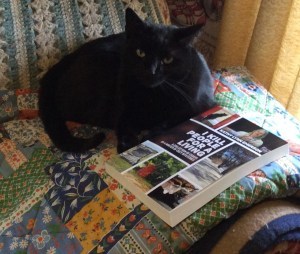
The ISBN is 978-1-393-71534-4 and it sells for $12.99. The e-book is also available, at $5.99. For 283 pages of text, I hope folks will find those prices reasonable. Feedback (comments, reviews, whatever) will be much appreciated.
An invitation to readers of this blog: Do you have news relating to Maine, Crime, or Writing? We’d love to hear from you. Just comment below to share.
And a reminder: If your library, school, or organization is looking for a speaker, we are often available to talk about the writing process, research, where we get our ideas, and other mysteries of the business. We also do programs on Zoom. Contact Kate Flora
April 22, 2021
The in Loss
Getting a little philosophical this morning, so if it’s early and you just want to drink your coffee in peace, I absolve you of responsibility. It’s been a strange couple of weeks on Trout Brook, and bound to get stranger, and there’s been a little more thinking than usual.
Those of us with aging parents  know how the life equation flip-flops at a certain inflection point, how the giver of care becomes the taker, and all the love and tension that go along with that. It’s not a new story, nor a particularly compelling one, except when it’s happening to you and then you are riveted and it is difficult to think about anything else. What that point brings, sometimes, is a sadness and a lean toward depression.
know how the life equation flip-flops at a certain inflection point, how the giver of care becomes the taker, and all the love and tension that go along with that. It’s not a new story, nor a particularly compelling one, except when it’s happening to you and then you are riveted and it is difficult to think about anything else. What that point brings, sometimes, is a sadness and a lean toward depression.
I’ve been watching Ken Burns’ excellent documentary about Ernest Hemingway and was struck all over again with how tortured and complicated his family life was, some of that inherited and some of it of his own doing. Depression and suicide ran in the family like blue eyes. He treated lovers, wives, and friends all horribly, apparently in service to a self-image that would not concede he was less than great and perfect and wonderful in all ways. Except, of course, when the black dog hit him and the depression consumed his brain.
Most writers, most artists I think, flirt with the black dog off and on.  Writing is a narcissistic occupation even in its most innocent exercise and no writer, I hope, is content to examine only the sunny side of a character or situation. It’s a necessary part of the work to tiptoe to the edge of the crevasse and stared down into it, maybe even a horrible pleasure sometimes.
Writing is a narcissistic occupation even in its most innocent exercise and no writer, I hope, is content to examine only the sunny side of a character or situation. It’s a necessary part of the work to tiptoe to the edge of the crevasse and stared down into it, maybe even a horrible pleasure sometimes.
I suspect the Hemingway 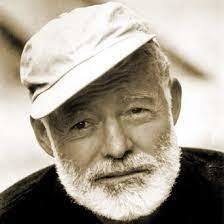 history is part of what underpins the still-prevailing cultural myth that writers and painters and sculptors and musicians and dancers must all suffer to practice their art at the highest level. It’s the kind of thinking that made Dave Brubeck take on a heroin addiction, to see if it would enhance his already magnificent talent. And I do think, when we’re young, we might embrace the possibility as if it were a simple equation: I hurt, therefore I create.
history is part of what underpins the still-prevailing cultural myth that writers and painters and sculptors and musicians and dancers must all suffer to practice their art at the highest level. It’s the kind of thinking that made Dave Brubeck take on a heroin addiction, to see if it would enhance his already magnificent talent. And I do think, when we’re young, we might embrace the possibility as if it were a simple equation: I hurt, therefore I create.
What I hope is that most artists realize, most people realize, that after a toe-dip in that black lagoon, that the making—writing, painting, building furniture—is more an occasion of joy than pain. The best work we do does not flourish in the dead crushed rock of depression or even unhappiness, but in joy. We do our work out of love as much as necessity, and depression, unhappiness, addiction, are not aids to creating, but impediments.
So as I watch my parents age and count their diminishments, I see them also learn that the losses they suffer are still less than the joy that remains, that always, always, there is something to come next, and it is well worth staying around for.
April 21, 2021
WHAT MAKES A GOOD BOOK TITLE GOOD?
As with pretty much everything from Catching Butterflies to Cooking Bread, you’ll find “how to” advice for creating book titles on the web.
An article that begins with “a good book title can mean the difference between a bestseller and a lifeless shelf-dweller” caught my attention. I mean, why do this ungodly amount of work only to spawn a “lifeless shelf-dweller”! 
So what, according to this commentary, makes a good book title good? IT –
• IS ON TARGET & UNIQUE: It captures the book’s essence, provokes curiosity, and “stakes out new territory in the arms race of book naming. You get an idea what’s inside and want to know more.
• CATCHES THE READERS’ ATTENTION: My favorite – “Death in The Time of Cholera”
• IS EASLY REMEMBERED: As in “Pride and Prejudice”.
• IS EASILY PRONOUNCED – Jennifer Lopez’s/Ben Affleck’s “Gigli” wasn’t.
• AVOIDS CONFUSION WITH OTHER BOOKS – “Girl on a Train” and “The Girl on the Train” are two different books. The first “Girl” wasn’t a best-seller, but it did get lots of sales by mistake.
NONFICTION Books should GET TO THE POINT OF THE CONTENT and, of course, also BE UNIQUE.
“How To Plant A Garden” is pretty vague, but “Six Steps to the Perfect Garden” is clearer. Another example: How to Win Friends and Influence People” is a lot better than “How To Be A Leader”.
FICTION TITLES
Instead of getting straight to the point, fiction titles should make you curious, provoke thought, and be mysterious. In other words, a potential reader would pick up the book not because they need information but because they are intrigued. Some Examples:
• Single Words: “Endurance,” “Nevermore”, “Boneshaker”.
• Poetic: “For Whom the Bells Tolls”
• Famous Sayings: “Till Death Do Us Part”, “Double Jeopardy”
• Quotes From Within The Book: “To Kill a Mockingbird”
• Wordplay: “Pride and Prejudice”, “Of Mice and Men”
• Opposing Subjects: “War and Peace”
OK, that’s the basics. Now, how does the author actually come up with a title?
Brainstorm – e.g. ask yourself what the book is really about and answer in three or four words. Use lines of poetry, song lyrics, etc. Ask family and friends for ideas. When desperate, turn to title generators (yes, they exist).
Write all this stuff down, then go back and choose the best ten. Reduce the number to a few based on suggestions above (e.g., is it catchy?)
Maybe test a few titles – e.g., create ads on Facebook and see which get the most clicks.
The draft of book number five in my Maine Oceanographer Mara Tusconi Mystery series is nearly done, and I do have a working title: THE SHARK, THE GIRL & THE SEA. Applying the rules above, I believe the title:
– Would make a reader curious, provoke thought, plus be mysterious and intriguing.
– Is true to the book and unique.
Bottom line, I hope this title will prompt potential readers to literally and figuratively pick up book five in the Mara Tusconi Mystery series, thumb through it, and purchase it!
April 19, 2021
Smart Fish. Tiny Home.
(Oops, this post ran last Sunday by mistake. This is it’s real day.)
Sandra Neily here: First the important stuff.  As if there weren’t enough barriers writing a novel in a small camper trailer, this morning I mistakenly took the dog’s Benadryl tablets instead of my meds. The fog descended. I have yet to stop staring at a spider that seems to be staring back at me. Sigh.
As if there weren’t enough barriers writing a novel in a small camper trailer, this morning I mistakenly took the dog’s Benadryl tablets instead of my meds. The fog descended. I have yet to stop staring at a spider that seems to be staring back at me. Sigh.

Wendy on top of someplace very, very cold
And here’s the next most important thing. I have a resourceful friend who overwintered in her cabin far away from roads. The Press Herald found her anyway!
I’ll let Wendy tell you about the book she’s just published. “ Living 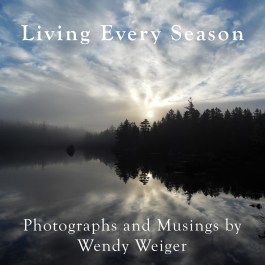 Every Season guides readers through the cycle of four seasons in the Maine Woods: the frigid white winter; the long, slow reawakening of spring; the lush green summer; and the glorious, almost impossibly bright autumn that fades, inexorably, into the austerity of another winter. Photos range from dramatic vistas of mountains, lakes, and skies to small details casual observers might miss: the delicacy of maple blossoms scattered on spring snow; the earthy colors and rich patterns of a fungus digesting a decaying log. This book will enhance readers’ sense of wonder and will help to open their eyes and their hearts to the natural world around them.”
Every Season guides readers through the cycle of four seasons in the Maine Woods: the frigid white winter; the long, slow reawakening of spring; the lush green summer; and the glorious, almost impossibly bright autumn that fades, inexorably, into the austerity of another winter. Photos range from dramatic vistas of mountains, lakes, and skies to small details casual observers might miss: the delicacy of maple blossoms scattered on spring snow; the earthy colors and rich patterns of a fungus digesting a decaying log. This book will enhance readers’ sense of wonder and will help to open their eyes and their hearts to the natural world around them.”
Congrats, Wendy!
*********
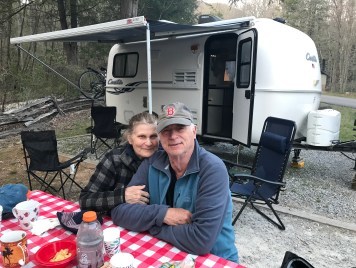 My husband and I have been on the road for almost a month, exploring creeks for wild trout (very smart fish), and staying in North Carolina national park and forest service campsites. I’m used to Maine camping in remote places, so sharing a campground with other travelers (sometimes over forty of them in tents, small campers, and very large generator-chugging RV’s) has been a new experience.
My husband and I have been on the road for almost a month, exploring creeks for wild trout (very smart fish), and staying in North Carolina national park and forest service campsites. I’m used to Maine camping in remote places, so sharing a campground with other travelers (sometimes over forty of them in tents, small campers, and very large generator-chugging RV’s) has been a new experience.

Raven, you are soooo busted!
But after a tightly-closeted year, it’s been a treat to give up privacy for friendly chats with neighbors. Just like kids on the road, my dog finds others to play with as soon as we pull in. (Other dogs, that is.) And she’s taken to sneaking onto the comfy parts of the trailer when she thinks we’ve gone out. Raven, you are so busted!

I assume there’s a bucket stashed in here.
I am announcing a great find, useful for campgrounds with no privacy and shared toilets that are practically in the next county. I saw parents with young ones (and a group of mountain bike guys) use these small tents for quick pee emergencies. Clever. Right?

Baillee is helping me by scouting for take-out delivery.
Trying to work on my third novel at our tiny table however, has not worked. I’m now writing this post from my sister’s Asheville home with her dogs keeping me company.
When my brain resists fiction, I write anecdotes from my river-guiding days. Folks have begged me to share the fun and drama. I will put together an ebook of them next year. Here’s a teaser.
*********

I’m heading into Cribworks Rapid (Class V), Penobscot River.
On my first day guiding a raft by myself (no longer a trainee), a guest broke her nose at as we slid over a huge waterfall that only looked like we’d dropped off the earth. (Think ancient maps where the flat earth just stops and dragons breathe fire in the margins).
She thrashed in the raft, showering us with red drops. Blood was everywhere.
“I’m getting married in ten days! I’m getting married in ten days!” she screamed. I’m getting married in ten days! Ten days!”
Cracking open an ice pack on the edge of my paddle, I soon realized I knew more than the panicked, first-year med students in her party. I also realized someone could actually talk herself into a medical crisis unrelated to the actual injury. The more she yelled, the grayer she got, screaming herself into shock right before our eyes.
“Stop now,” the med students yelled at me.
“Pick up your paddles and be quiet,” I yelled back. “Unless you see a road that I don’t see, we’re going downriver.”
Elevating her head on my lap, I positioned the cold pack so it also covered her mouth. “Hold that and you’ll be fine,” I said. Her suppressed sobs vibrated through my long underwear and rain pants.
I’d already sent the secret Get-Me-A-Backboard signal to other guides on the trip. (That was my horizontal hand sliding sideways lots of times across my throat. Guide gallows humor.) EMT’s in their boats shadowed me as we pulled into a small beach near our trip vehicles. They had her immobilized on the board, covered with blankets, and even smiling as they loaded her into our cook van for the run to Millinocket’s hospital.
She met us as the trip’s end, holding her fiancée’s hand and gently fingering the bandage over her nose.
“They’ll try and sue you,” said one of our bus drivers. “You’re a green guide just out of the chute. No pun intended on that, but no way that face in ten days will go with something filly and white.”
I thought he might be right. Being married to the company owner had some perks. He agreed to do whatever I thought might be helpful. Near her home we found a professional make-up artist and gifted her with a complete hair and makeup session the day of her wedding. In the pictures she sent us, she looked gorgeous. And happy.
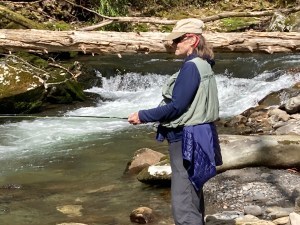
Western NC creek fishing. Very smaaaart fish……
My husband, the company owner, was happy, too.
**********
I guided for fifteen years and that was the worst guest injury I ever had. Well, someone on the Dead River yelled he was so ill he was going to die for sixteen roadless miles of flood-level huge waves.
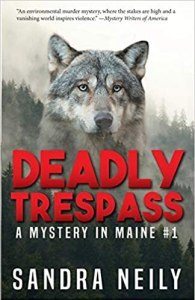 That’s another adventure—along with skinny dipping where a hidden game warden had a spotting scope. (That story’s in my second novel, Deadly Turn.) Never waste good material.
That’s another adventure—along with skinny dipping where a hidden game warden had a spotting scope. (That story’s in my second novel, Deadly Turn.) Never waste good material.
The second Mystery in Maine, Deadly Turn, was published in 2021. Her debut novel, “Deadly Trespass, A Mystery in Maine,” won a national Mystery Writers of America award, was a finalist in the Women’s Fiction Writers Association “Rising Star” contest, and was a finalist for a Maine Literary Award. Find her novels at all Shermans Books (Maine) and on Amazon. Find more info on Sandy’s website.
April 18, 2021
It’s Patriots’ Day
Kathy Lynn Emerson/Kaitlyn Dunnett here. Today, Patriots’ Day (as opposed to Patriot’s Day) is a state holiday here in Maine. You may remember being forced to memorize “Paul Revere’s Ride” by Henry Wadsworth Longfellow in school, the one that begins, “On the eighteenth of April, in Seventy-Five:/Hardly a man is now alive/Who remembers that famous day and year.” For those who don’t remember, April 18, 1775 directly preceded the skirmishes between patriots and English soldiers in Lexington, Concord, and Menotomy (now Arlington), Massachusetts—the battles that marked the start of the Revolutionary War. In 1975, it was the date we first saw the house we still live in, but I digress.

Why do we celebrate in Maine? Because Maine was part of Massachusetts until 1820. The holiday became official here in 1907. Since 1969, it has been observed on the third Monday in April, which also marks the start of school vacation week. Until last year, it was also celebrated by a reenactment of the Battle of Lexington, the running of the Boston Marathon, and a late-morning Red Sox game in Massachusetts and by (on the third Saturday of the month) the Kenduskeag Stream Canoe Race in Maine. This year the reenactment is virtual and the marathon won’t be run until October 11, but the fifty-fourth running of the canoe race, with some precautions, went on as scheduled.

I love this race! No, I’ve never participated. Nor have I stood on the banks of Kenduskeag Stream or the Penobscot River to watch the paddlers. I’m strictly an armchair spectator, but that doesn’t mean it’s any less of an annual event for me. This year, as expected, was different. The number of entrants was limited. There were no crowds allowed to watch in person. Masks were required. Even television coverage, which is usually live, was changed to livestreaming on Facebook and an hour-long special scheduled for ten in the morning on April 24 on WABI (Channel 5), the local Bangor station. Then it turned up on the News Center Maine (Channels 2 and 6) website, streaming live, which I could watch on my pc or my iPad with Shadow. Unfortunately, it wasn’t exactly riveting entertainment this time around. The most excitement came when canoes got stuck on rocks (the water was a record low) and paddlers simply stepped out up to their ankles and pushed them off. There was no commentary, just the sound of rushing water and the occasional distant mumble of people talking or shouting. And the single camera had only one angle, although they could zoom in on occasions.

On the bright side, at least it took place this year.

My protagonist in the Deadly Edits series, Mikki Lincoln, now living in New York State but formerly a fifty-year resident of rural Maine, is also an ardent fan of this race. In 2019, the year in which A Fatal Fiction is set (although that’s never stated outright) she was able to watch the race live on the WABI website.
If you’d like to know more, there are lots of pictures and videos of this year’s and past years’ races, along with general information on the race itself, at the following links:
https://www.kenduskeagstreamcanoerace.com/info/info/
https://www.facebook.com/kenduskeagstreamcanoerace

Kathy Lynn Emerson/Kaitlyn Dunnett has had sixty-three books traditionally published and has self published several children’s books and three works of nonfiction. She won the Agatha Award and was an Anthony and Macavity finalist for best mystery nonfiction of 2008 for How to Write Killer Historical Mysteries and was an Agatha Award finalist in 2015 in the best mystery short story category. She was the Malice Domestic Guest of Honor in 2014. Her next publication (as Kaitlyn) is the fourth book in the contemporary “Deadly Edits” series (Murder, She Edited), in stores in August 2021. As Kathy, her most recent novel is a standalone historical mystery, The Finder of Lost Things. She maintains websites at www.KaitlynDunnett.com and www.KathyLynnEmerson.com. A third, at A Who’s Who of Tudor Women, is the gateway to over 2300 mini-biographies of sixteenth-century Englishwomen, now available in e-book format.
April 16, 2021
Weekend Update: April 17-18, 2021
 Next week at Maine Crime Writers there will be posts by Kaitlyn Dunnett/Kathy Lynn Emerson (Monday), Sandra Neily (Tuesday), Charlene D’Avanzo (Thursday) and Dick Cass (Friday).
Next week at Maine Crime Writers there will be posts by Kaitlyn Dunnett/Kathy Lynn Emerson (Monday), Sandra Neily (Tuesday), Charlene D’Avanzo (Thursday) and Dick Cass (Friday).
In the news department, here’s what’s happening with some of us who blog regularly at Maine Crime Writers:
Book Birthday:
Coming April 20th: A World of Deceit, Kate Flora’s 7th Joe Burgess police procedural:
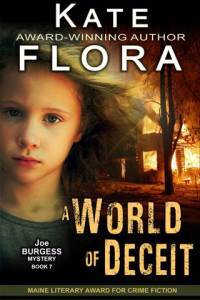
An invitation to readers of this blog: Do you have news relating to Maine, Crime, or Writing? We’d love to hear from you. Just comment below to share.
And a reminder: If your library, school, or organization is looking for a speaker, we are often available to talk about the writing process, research, where we get our ideas, and other mysteries of the business. We also do programs on Zoom. Contact Kate Flora
So Joe Burgess Tries To Go On Vacation – – –
Kate Flora: I was sitting here, taking a break from the book that still won’t tell me what it’s about, and watching heavy snow flatten my gorgeous daffodils when suddenly I realized: Wait! I’m supposed to be blogging today. Oh dear. What to write about? Then I remembered that recently someone asked me if I’d blogged about the new book yet. I’ve mentioned it, sure, but have I really talked about it in depth?
On Monday, I did a Zoom author event with the Bristol, Maine library, and one of the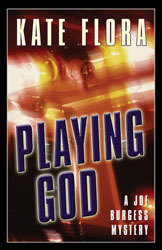 things I talked about was what it’s like when you’re lived with your characters for many years and watched them grow and change. I started writing the Joe Burgess series back in the 1990’s, and had a draft of the first book, Playing God, written when I first got in touch with the Portland police department to get some background to make my character feel authentic.
things I talked about was what it’s like when you’re lived with your characters for many years and watched them grow and change. I started writing the Joe Burgess series back in the 1990’s, and had a draft of the first book, Playing God, written when I first got in touch with the Portland police department to get some background to make my character feel authentic.
Backing up a bit more, in 1998 or 1999, on January 2nd, I sat down at my computer with two story ideas in my head, one for the next Thea Kozak and one for the first Joe Burgess. I poised my fingers over the keyboard, wrote Chapter One, and waited to see which character would demand my attention. It was Joe. I embarked on an adventure that I’d never embarked on before. Spurred by comments people had made at author events, including “I’ve always wanted to write a book and sometime, when I have a free weekend, I’m going to write one,” I decided to see how fast I could write a book.
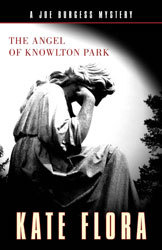 I wrote obsessively. I wrote ten to twelve hours a day. I used so many words each day I was too exhausted to converse by the time I left my seat. I spent all my energy and all my waking hours with Burgess and his team, and at the end of four and half months, I had a 485 page manuscript. The obsession ended but I quickly realized that I had spent so much time with my fictional characters that when I was done I was lonely. I was bereft. I felt like my closest friends had abandoned me. After a brief respite, I started the second book at a more normal pace.
I wrote obsessively. I wrote ten to twelve hours a day. I used so many words each day I was too exhausted to converse by the time I left my seat. I spent all my energy and all my waking hours with Burgess and his team, and at the end of four and half months, I had a 485 page manuscript. The obsession ended but I quickly realized that I had spent so much time with my fictional characters that when I was done I was lonely. I was bereft. I felt like my closest friends had abandoned me. After a brief respite, I started the second book at a more normal pace.
But something we series writers don’t often talk about is how much a part of our lives our characters become. We spend a lot of time with them, imagining them, sometimes watching them take over the narrative for a while or go in an unplanned direction. They feel very real and very much a part of our lives. So when I started writing the current book, I was very aware that I had just put Burgess, and Kyle, and Perry, and their families, through hell in A Child Shall Lead Them. I had started the series envisioning Burgess as a damaged man, his world view darkened by the things he’s see. In this book, I had made it far, far worse. Burgess was worn out. Traumatized by what he’s seen. Thinking about retirement. So in the new book, I sent Burgess, and Chris, and the kids on vacation, to a cottage on a peaceful Maine lake.
That peace didn’t last very long. On day two, as Burgess is snoozing in a hammock, waiting for the pills his doctor hopes will restore his energy to kick in, he is awakened by a small girl who tells him she’s renting the cottage next door with her father, and her father won’t wake up. As much as Burgess might like to say no, he’s a cop, he’s a protector of the weak and vulnerable. He can’t say no to a child. But what he finds in the cottage where Arielle’s father lies in a coma is suspicious. He can’t help but poke around, even though it’s not his job, his problem, his jurisdiction. And so his badly needed vacation becomes a tug of war between his own, and his family’s need for a quiet break, and his need to be sure the circumstances of Dr. Gabbro’s condition are investigated.
Add in his new crime scene dog, Fideau, some rich kids who think the rules don’t apply to them, and Gabbro’s toxic family, and R&R becomes increasingly hard to find.
eBook978-1-64457-090-6Paperback978-1-64457-091-3

April 15, 2021
Night lights: what are they afraid of?
We live in a neighborhood of seasonal houses. Most are owned by families from other New England states, especially Massachusetts. Except for my nephew, who has the house next to ours, the owners are not really known to us. They come mostly on weekends, to ski in the winter and play golf in the summer. We exchange waves on the road but rarely talk since they move about mostly in cars. The neighbors immediately across the road are a bit of an exception in that we can’t avoid brief conversations. I’ve written about them here before after they went on a rampage of tree clearing. Despite that, we have a reasonably civil relationship with them and with other seasonal owners in the neighborhood. As Melville’s Ishmael says, “it is but well to be on friendly terms with all the inmates of the place one lodges in.” And I give them credit for making long drives to spend just a few days at a time in Maine to enjoy all the outdoor activities we who live here are privileged to enjoy full time.
But there’s one thing I don’t understand about these seasonal residents: why are they afraid of the night? Within minutes of their arrival, floodlights come on. Of course it makes sense that they want to see while they unload their cars. But those floodlights stay on all night. Some turn them off in the morning, which makes you think they just forgot, but it’s hard to imagine that from the inside of their houses they don’t notice their yards bathed in light. Then the next night, on come the lights again. Sometimes, especially on a three-day weekend, the road through our neighborhood looks more like Times Square than a spot in rural Maine.
So, one of my permanent resident neighbors asked me, what are they afraid of? What do they think all those floodlights protect them from? Surely not burglars or drug gangs. If not humans, maybe an angry moose? A rogue bear? Who knows. Since most of these neighbors are not city folk, I don’t think they just miss the round-the-clock lights of an urban world. And I doubt that they illuminate the backyards and swimming pools of their suburban houses. No, I suspect it’s just that they think the woods of Maine present dangers against which all-night lighting can save them.
It’s reasonable to wonder why I don’t take my question to them directly. I have asked my immediate neighbors to please turn off their floodlights overnight since they shine directly into our bedroom. They comply only sporadically, not registering that the problem isn’t a one-off but a recurring one. In the interest of neighborliness I resist opening a battle over night lights, hoping they will sometime get it. On one occasion my immediate neighbors left a set of floodlights on when they drove off on a Sunday evening. The next day I took a ladder and climbed up and unscrewed the bulbs. When they came back I saw them checking it out and eventually replacing rather than re-screwing the bulbs. I got away with that one!
Sometimes I fantasize about getting a mailing list of my neighbors and sending a questionnaire asking why they light their outdoor areas so aggressively, but I suspect the response rate on that would be low. I could go door to door asking them, but that would probably only confirm for them that Maine is inhabited by eccentric old dudes–perhaps a threat that would justify their all night lighting. 
Why do these aggressive night lights bother me? Aside from the one that shines into our bedroom, the others really don’t have a direct impact on us. I think the reason the night lighting mania troubles me is that it destroys, or at least undermines, one of the reasons for living in a rural areas: to enjoy the real night lights, the stars that shine so brightly away from city lights. I don’t know the details of the stars and planets, but I know that going out on a clear night and observing the natural wonder of it is a joy. I wish my lighting-up neighbors could experience the same pleasure, but that would require them to have a different understanding of night lights.
Lea Wait's Blog
- Lea Wait's profile
- 506 followers



